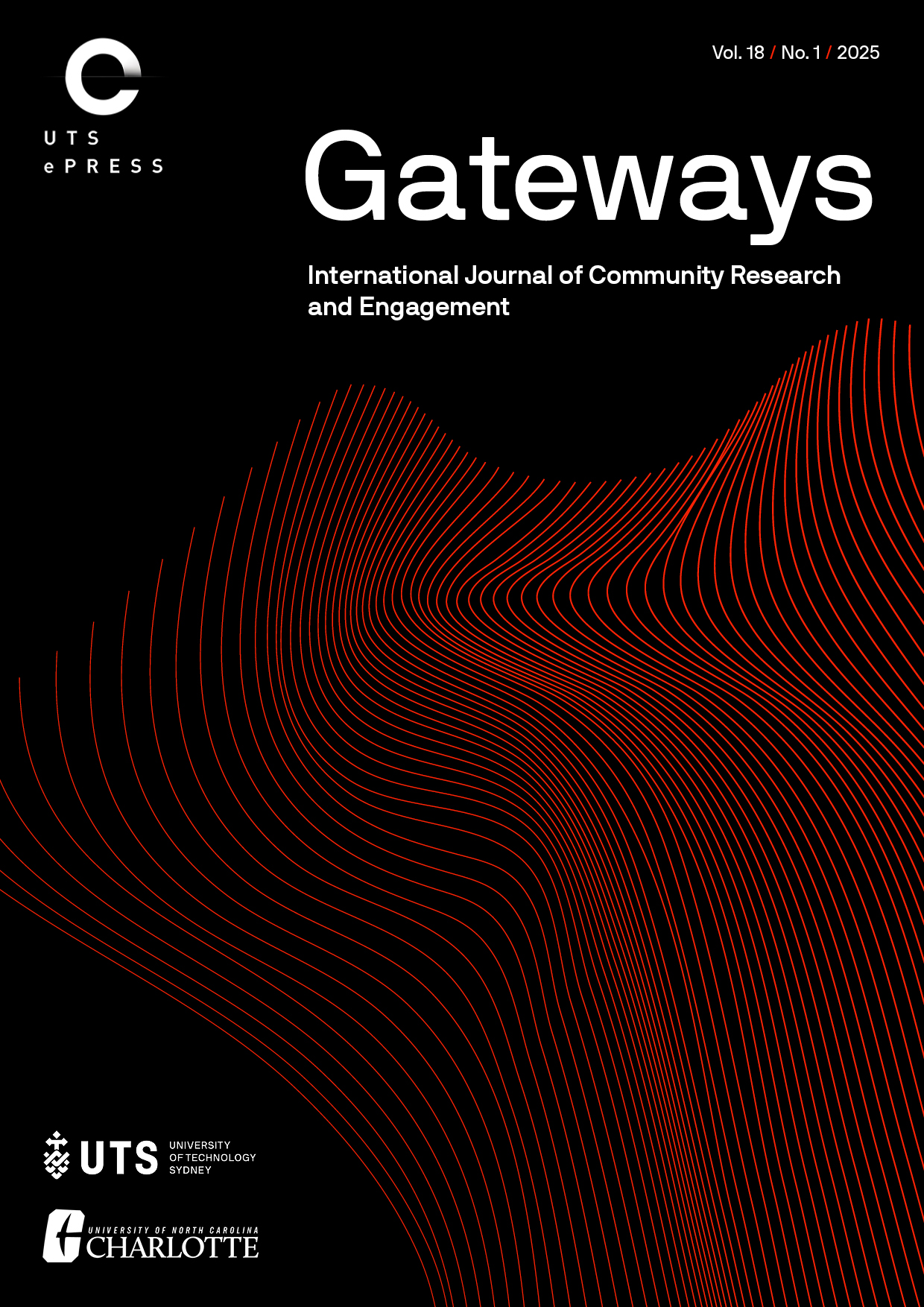A curated walk with peer researchers and their communities: Engaging a research journey toward meaningful impact
Main Article Content
Abstract
As a collective of peer researchers, scholars and members of a non-profit organisation, we have come together to share a curated walk through low-income communities in Cape Town and London. We do so with the intent of exploring the embodied and social experiences of walking and writing research differently through a collaborative process of listening, co-creating and sharing knowledge about the pedestrian mobilities of young men as mediated by the precarities of urban life. Our walking-writing practices are a hybrid of the actual practices of walking and potential for enacting change by valuing the everyday experiences and knowledge of peer researchers. The curated walk that we share guides readers on the research journey that we have taken together from the homes of those involved to the metaphorical centre of power in the cities/regions where our work takes place, with the intention of long-term, meaningful impact.
Article Details
Issue
Section
Authors who submit articles to this journal from 31st March 2014 for publication, agree to the following terms:
a) Authors retain copyright and grant the journal right of first publication with the work simultaneously licensed under a Creative Commons Attribution License that allows others to share and adapt the work with an acknowledgement of the work's authorship and initial publication in this journal.
b) Authors are able to enter into separate, additional contractual arrangements for the non-exclusive distribution of the journal's published version of the work (e.g., post it to an institutional repository or publish it in a book), with an acknowledgement of its initial publication in this journal.
c) Authors are permitted and encouraged to post their work online (e.g., in institutional repositories or on their website) prior to and during the submission process, as it can lead to productive exchanges, as well as earlier and greater citation of published work (See The Open Access Citation Advantage Service). Where authors include such a work in an institutional repository or on their website (ie. a copy of a work which has been published in a UTS ePRESS journal, or a pre-print or post-print version of that work), we request that they include a statement that acknowledges the UTS ePRESS publication including the name of the journal, the volume number and a web-link to the journal item.
d) Authors should be aware that the Creative Commons Attribution (CC-BY) License permits readers to share (copy and redistribute the work in any medium or format) and adapt (remix, transform, and build upon the work) for any purpose, even commercially, provided they also give appropriate credit to the work, provide a link to the license, and indicate if changes were made. They may do these things in any reasonable manner, but not in any way that suggests you or your publisher endorses their use.
For Volume 6 (2013) and before, the following copyright applied:
Articles published by UTSePress are protected by copyright which is retained by the authors who assert their moral rights. Authors control translation and reproduction rights to their works published by UTSePress. UTSePress publications are copyright and all rights are reserved worldwide. Downloads of specific portions of them are permitted for personal use only, not for commercial use or resale. Permissions to reprint or use any materials should be directed to UTSePress.
References
Devotta, K, Woodhall-Melnik, J, Pedersen, C, Wendaferew, A, Dowbor, TP, Guilcher, SJ, Hamilton-Wright, S, Ferentzy, P, Hwang, SW & Matheson, FI 2016, ‘Enriching qualitative research by engaging peer interviewers: a case study’, Qualitative Research, vol. 16, no. 6, pp. 661-680. https://doi.org/10.1177/1468794115626244
Middleton, J & Samanani, F 2021, ‘Accounting for care within human geography’, Transactions of the Institute of British Geographers, vol. 46, no. 1, pp. 29–43. https://doi.org/10.1111/tran.12403
Mosavel, M, Ahmed, R, Daniels, D & Simon, C 2011, ‘Community researchers conducting health disparities research: Ethical and other insights from fieldwork journaling’, Social Science & Medicine, vol. 73, no. 1, pp. 145-152. https://doi.org/10.1016/j.socscimed.2011.04.029
Porter, G 2016, ‘Reflections on co-investigation through peer research with young people and older people in Sub-Saharan Africa’, Qualitative Research, vol. 16, no. 3, pp. 293–304. https://doi.org/10.1177/1468794115619001
Porter, G, Dungey, C, Murphy, E, Adamu, F, Bitrus Dayil, P, & de Lannoy, A 2023, ‘Everyday mobility practices and the ethics of care: young women’s reflections on social responsibility in the time of COVID-19 in three African cities’, Mobilities, vol. 18, no. 1, pp. 21-36. https://doi.org/10.1080/17450101.2022.2039561
Porter, G, Dungey, C with peer researchers Akoshi, M, Bullus, PH, Houiji, R, Matomane, S, Mohammed, AU, Musa, AI, Nasser, W, Usman, UN 2023, ‘Peer research, power and ethics: Navigating participatory research in an Africa-focused mobilities study before and during COVID-19’, In B Percy-Smith, NP Thomas, C O'Kane, AT-D Imoh (eds), A Handbook of Children and Young People’s Participation: Conversations for Transformational Change, Routledge, London, pp. 140-146. https://doi.org/10.4324/9781003367758
Rink, B 2020, ‘Mobilizing theory through practice: authentic learning in teaching mobilities’, Journal of Geography in Higher Education, vol. 44, no. 1, pp. 108-123. https://doi.org/10.1080/03098265.2019.1695107
Sagaris, L, Costa-Roldan, I, Rimbaud, A & Jennings, G 2022, ‘Walking, the invisible transport mode?’, Report for Volvo Research and Educational Foundations, January 2022.
Yang, C & Dibb, Z 2020, Peer Research in the UK. Working Paper. Institute for Community Studies.
